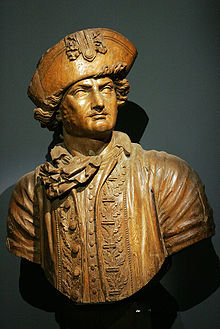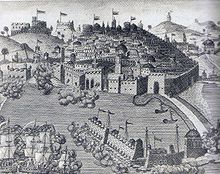- Abraham Duquesne
-
Other topics that could fall under Duquesne can be found at Marquis Duquesne (disambiguation)
 Figurehead of the Duquesne of 1814
Figurehead of the Duquesne of 1814
Abraham Duquesne, marquis du Bouchet (c. 1610 – February 2, 1688) was a French naval officer, who also saw service as an admiral in the Royal Swedish Navy. He was born in Dieppe, a seaport, in 1610, and was a Huguenot. He was the son of a naval officer and therefore became a sailor himself, spending his early years in merchant service.
Contents
In 1635, he was capitaine de vaisseau (captain) in the French navy. In 1636, he was appointed to the "Neptune" squadron. In May 1637 he gained some fame for capturing the island of Lerins from the Spanish. Around this time, his father died in a conflict with the Spanish, which permanently increased his animosity towards them and he sought revenge. He fought them viciously at the Battle of Guetaria in 1638, during the expedition to Corunna in 1639, and in the battles at Tarragona in 1641, Barcelona and the Cabo de Gata.
Duquesne then left to join the Swedish navy in 1643. On the side of the Swedes, he fought the Danish fleet at the Battle of Colberger Heide where King Christian IV himself was in command of the Danish fleet, in the frigate Regina 34. Later at Fehmarn, the Danes were decisively defeated, their admiral Pros Mund killed and his ship taken. After a peace had been reached between the Danes and the Swedes in 1645, he returned to France.
Return to French service
 Bombardment of Algiers in 1682, by Abraham Duquesne.
Bombardment of Algiers in 1682, by Abraham Duquesne.
 Bombardment of Genoa by Duquesne in 1684, by Beaulieu le Donjon.
Bombardment of Genoa by Duquesne in 1684, by Beaulieu le Donjon.
He suppressed a revolt at Bordeaux (which was materially supported by his most hated foe, the Spanish) in 1650, during the Fronde outbreaks. During that same year, he created at his own expense a squadron with which he blockaded the Gironde, forcing that city to surrender. This earned him a promotion in rank to chef d'escadre (Rear-Admiral), a castle, and a gift of the entire isle of Indre, Loire-Atlantique. The French and the Spanish made peace in 1659, which left him to fight pirates in the Mediterranean Sea. In 1667 he is promoted 'Lieutenant-Général (Vice-Admiral). He distinguished himself in the Third Dutch War, fighting as second in command of the French squadron at the Battle of Solebay and later supporting the insurgents in the revolt of Messina from Spain, fighting Admiral Michel Adriaanzoon de Ruyter, who had the united fleets of Spain and the United Provinces under his command. He fought the combined Dutch-Spanish fleet at the Battle of Stromboli and the Battle of Agosta where De Ruyter was mortally wounded. On the 2nd of June he was present as second in command when the French fleet under Comte and Vivonne attacked and partly destroyed the Spanish-Dutch fleet at the Battle of Palermo, which secured French control of the Mediterranean. For this accomplishment he received a personal letter from Louis XIV and was given, in 1681, the title of marquis along with the estate of Bouchet, even though he was a Protestant.
Duquesne also fought the Barbary pirates in 1681 and bombarded Algiers between 1682 and 1683,[1] to help Christian captives, and bombarded Genoa in 1684.
Last years
In that same year, 1684, he retired from poor health. He may have foreseen the revocation of the Edict of Nantes in 1685, though he was exempted from the proscription. He died in Paris on 2 February 1688.
Trivia
- The Marquis Duquesne de Menneville, another famous mariner, was his grandnephew
- 8 vessels of the French Navy have been named in his honour, see French ship Duquesne
Notes
Categories:- 1610s births
- 1688 deaths
- French Navy admirals
- People from Seine-Maritime
Wikimedia Foundation. 2010.

